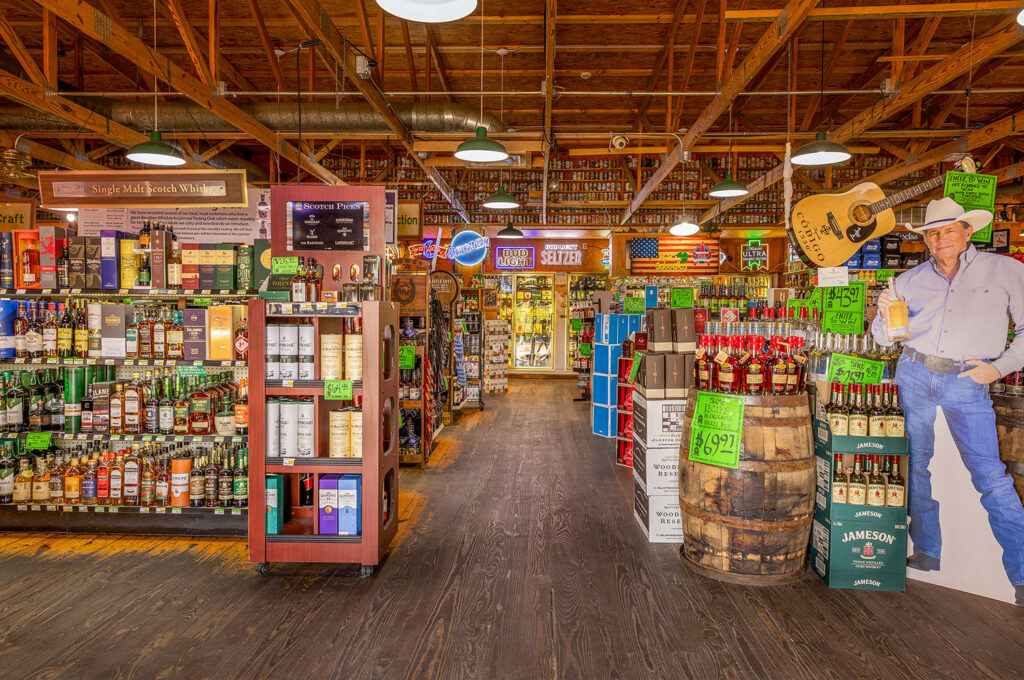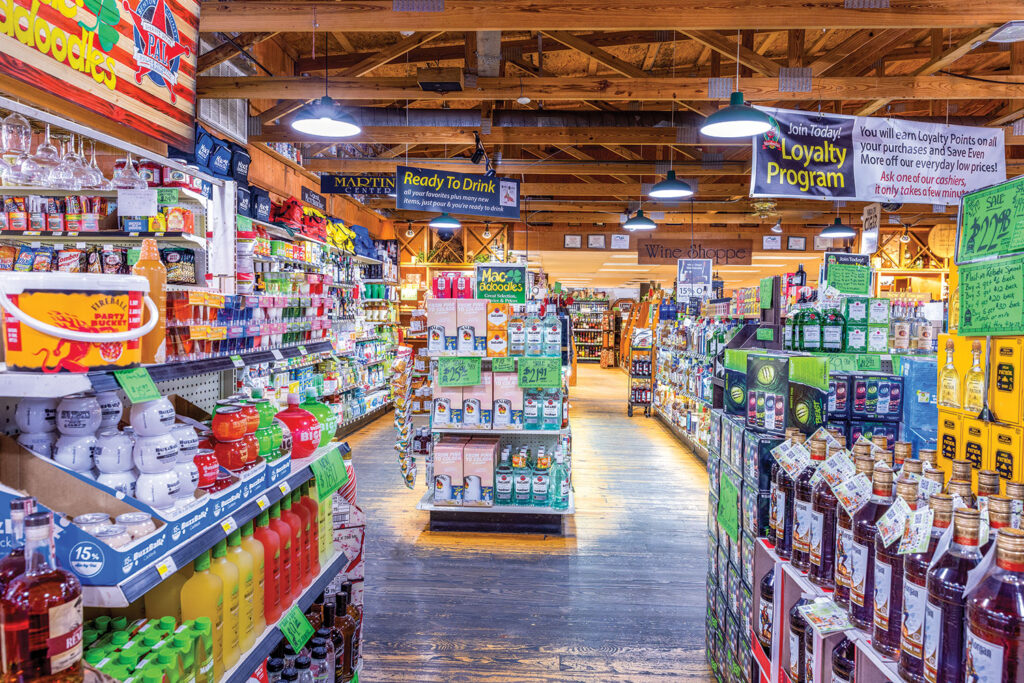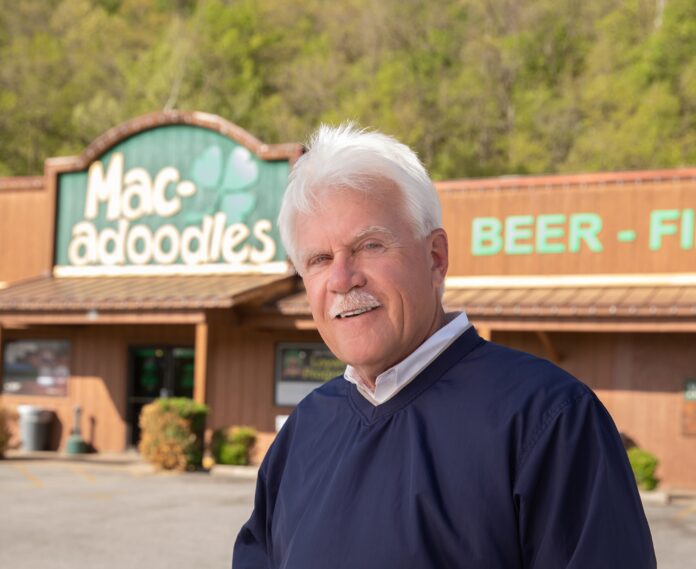For the second year in a row, Beverage Dynamics has recognized Missouri-based Macadoodles as the Retailer of the Year.
Our article in 2023 focused on how founder Roger Gildehaus perfected his retail acumen, as an executive working at Walmart under its founder Sam Walton. Lessons learned from Walton helped propel Gildehaus to success in beverage alcohol retail after leaving his former career.
Today, Gildehaus and his company count two corporate stores in addition to a rapidly growing number of franchise locations. At the time of this article, Gildehaus had just returned from opening a new location in Omaha, with two more spots slated for later in 2024. Altogether, the number of franchisees is fast approaching the mid-teens, thanks to a strategy that Gildehaus calls the Macadoodles program.
“It’s important that the store manager is following the Macadoodles program,” Gildehaus says. “There’s a lot of things in the program, big and small, but they all add up to making a Macadoodles store successful.”
Franchising: First Steps
Why has Gildehaus gone down the path of franchising his retail brand?
“We want to keep growing it,” he says. “You never know what the future will bring. Maybe someone will come along and want to buy all of it, or maybe we’ll keep doing it ourselves.”
People interested in becoming a Macadoodles franchisee start by reaching out to the company. From the very beginning, everything follows specific procedures meant to maximize the potential for success.
“A guy who works for me makes the initial contact with interested parties and lets them know what the process is: What to expect and what not to expect,” Gildehaus says.
What to expect includes what the interested parties will receive for their franchise fee. That is: a high level of guidance from corporate, much of it hands on, along with the Macadoodles blueprint to follow. This kicks off with Gildehaus and his team meeting with possible franchisees in their personal market to help them pick out a location for the new store.
“Many times, I pick out the location that the franchisee had picked out,” Gildehaus says. “But sometimes I say, ‘Let’s look around for a more-suitable location closer to where the homes are and where the cities growth is going.”
Gildehaus also meets with local vendors and distributors, and he designs the merchandise layout for the new location. This includes details as fine as figuring out the opening endcaps and featured SKUs.
“I’m looking at each supplier and distributor and seeing what they recommend, what the key volumes are,” Gildehaus says. “As for the featured items, that depends on the market. Missouri is month to month. Nebraska and other states we’re in are ‘deal buy’ states.”
In these markets, if a key item is not on sale when the store opens, Gildehaus will still stock it (of course), but recommends the new owner wait to feature the product until the deal is better.
“Don’t put it on feature display yet because it’s not on its lowest price,” he says. “I’m always looking out for the franchisee.”
Additional areas where Gildehaus has the franchisee’s best interests at heart are architecture and construction. He has the same architect firm design all the stores, and suggests that new owners use his preferred builder out of Kansas.
“He has built many of my stores before,” Gildehaus explains. “He builds them twice as fast. I always tell franchisees, ‘Time is money’.”
If franchisees choose his builder, Gildehaus estimates that the total time from expressing first interest to opening a new Macadoodles store is about nine to ten months.

The Macadoodles Program
Gildehaus personally assists with the opening, staying in that new location for several weeks as he helps the business begin right. Afterwards, Gildehaus or a member of his team will return to that store every four to six weeks, spending several days with the management team. These interactions include pointing out aspects of the store that are not up to standard.
That standard is the Macadoodles program. The set of rules and principles that have helped propel this beverage alcohol retail brand to best-in-class status.
Example: corporate Macadoodles employees visiting franchises will perform competitive price checks to make sure that the store prices are not too high compared with competitors.
Also: The Macadoodles layout itself. “I don’t want franchises to make dramatic changes to our layout,” Gildehaus says. “We have stores in tourist markets. When people get used to the Macadoodles store in their hometown and then they walk into another one while on vacation, and it’s all laid out the same way as in the hometown, that’s what we’re going for.”
“Now I’m not saying that all stores have to look exactly the same,” he adds, “but the categories should be in the same place from store to store.”
From there, “it’s up to each store to judge their rate of sales,” Gildehaus explains. “If they see something that the market is telling you everyone wants, jump on that. When an item is on a deal buy, promote it heavily.”
The Macadoodles program permeates into the atmosphere. “We own our own music playlist, about 450 songs, created by my daughter and me,” Gildehaus says. “There’s no rap, no heavy metal. When a customer walks in, they’re greeted by the corner cashiers, who say, ‘Welcome to Macadoodles’, in a friendly voice. And I want the music to sound like customers are going to a party. We play music louder, and lively.”
As customers proceed into the wine room, however, the music becomes more subdued. “It’s an upscale look in there,” Gildehaus says. “And the music isn’t as loud because there’s more one-on-ones, with employees handselling bottles.”
Customers can taste wines seven days a week at all Macadoodles. The stores also offer free coffee and popcorn every day. Buyers of beer receive a complimentary bag of ice to keep their purchase cold on the ride home.
“That’s so important,” Gildehaus says of all these Macadoodles perks. “We want people to be comfortable while shopping in the store.”
A few years ago, Macadoodles rolled out a new loyalty program. The result has been impressive. “One store, in the first 90 days, had 10,000 customers sign up,” Gildehaus recalls.
Why? Everything bought generates points that can later go towards discounts on future purchases. “Whatever you want,” Gildehaus says. “I don’t know any other store in the country running a loyalty program like this.”

Digital Improvements
A new Macadoodles website launched several months ago to similar success. The goal was to make the site more user friendly. It worked. “I’ve gotten more emails in the last eight months than in the previous 26 years,” Gildehaus observes.
The website has ecommerce capabilities. Using Bottlecaps, Macadoodles offers free deliveries, carried out by store staff rather than a third-party provider.
“I had one franchisee who said they wanted to charge for delivery, but I said no, that’s not the Macadoodles program,” Gildehaus says. “I want to give the customer the best experience possible. We don’t allow our delivery drivers to get tips. We take care of them through their wages.”
Why use store staff instead of independent delivery apps? “I feel much safer having Macadoodles associates deliver products, because they have been trained in the critical nature of how alcohol and tobacco cannot get into the hands of minors,” Gildehaus says.

How Franchises Succeed
With so many stores spread across numerous states and markets, it begs the question: What makes a successful Macadoodles franchise?
“Ownership involvement,” Gildehaus answers. “I’ve had discussions with potential franchisees. They’ve said, ‘I own a business but want to invest in yours. I cannot be totally involved all the time.’ I say, ‘Then let’s find a high-quality person, and send them to me for three weeks of extensive training.”
“Active ownership or a well-trained manager is key,” he adds. “We don’t want you to fail. We want you to be proud to be a Macadoodles owner.”
From there, success boils down to running the Macadoodles program, seven days a week.
“That means giving customers the best overall assortment at the best prices, with the best customer service, and all of the other hundreds of things, too,” Gildehaus says. “Those stores succeed the fastest.”
Kyle Swartz is editor of Beverage Dynamics. Reach him at kswartz@epgmediallc.com. Read his recent piece, What’s the Future of the Whisky Industry?






